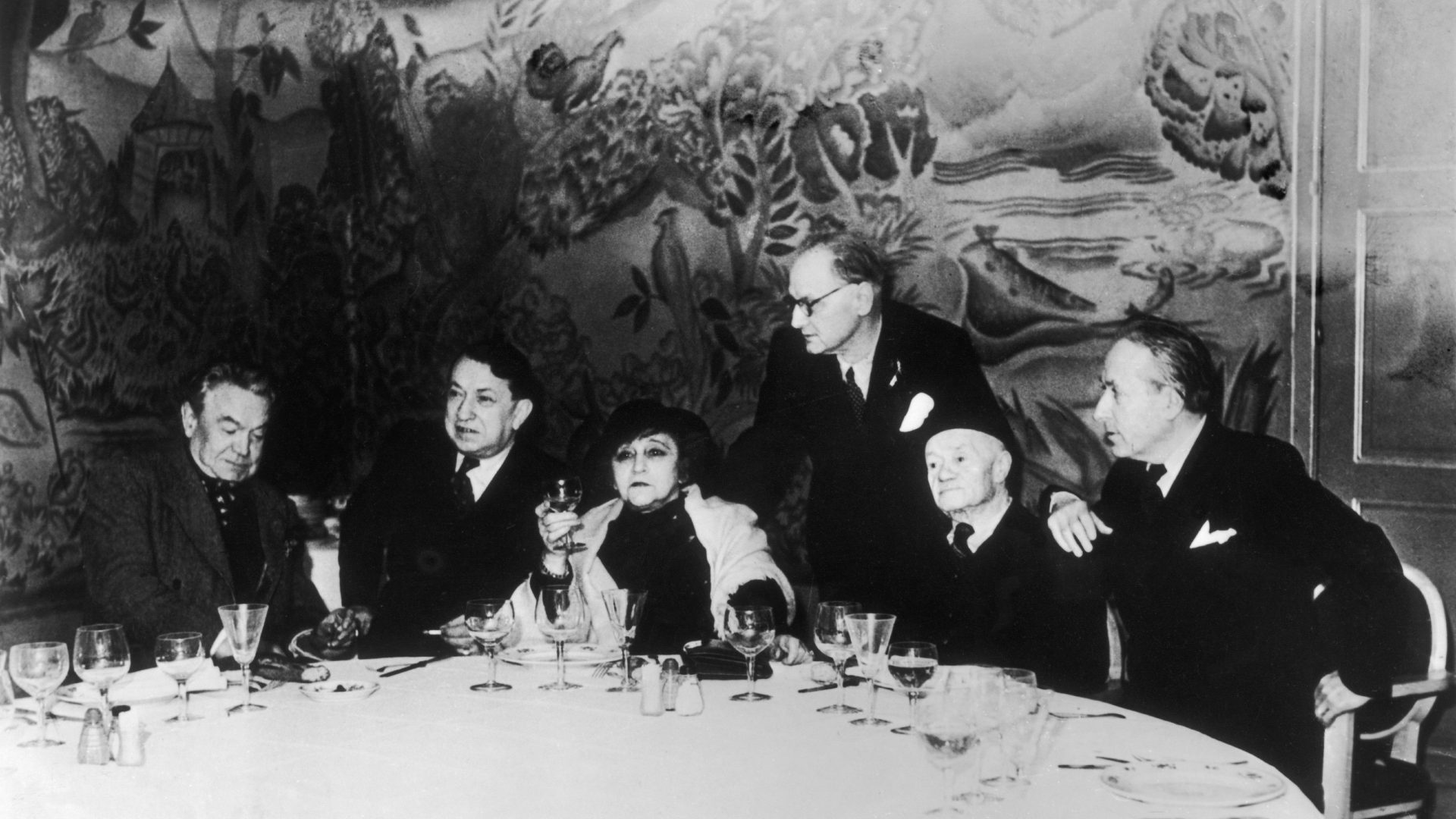France announced the winner of the Prix Goncourt last week in the traditional manner. The 10 judges, as they have every year since 1914,
gathered on the first floor of the Drouant restaurant in Paris’s 2nd
arrondissement to get thoroughly stuck into a hearty lunch and name Brigitte Giraud as this year’s recipient of one of Europe’s most prestigious
and lucrative literary gongs.
Giraud won with her novel Vivre vite (Live Fast), a heartbreaking work based on the death in 1999 of her partner in a motorcycle accident. Railing against the twin demons of chance and fate, the book charts events leading up to the crash, all the tiny moments that – had they played out even slightly differently – would have made that a normal day just like any other.
Many pundits had fancied Le Mage du Kremlin (The Wizard of the Kremlin), by Giuliano da Empoli, already a bestseller in France, and what was always destined to be a close contest needed the casting vote of jury president Didier Decoin after the maximum 14 rounds of voting had failed to separate them.
As Decoin would have been well aware, not least because he won the prize himself in 1977, careers and lives rested on his decision. The Prix Goncourt comes with a token cheque for just €10 but such is its prestige the chosen book is guaranteed to become a thumping bestseller. The 2020 winner, Hervé Le Tellier’s L’Anomalie, published in English as The Anomaly and reviewed in glowing terms in these pages, went on to sell more than a million copies. Vivre vite is tipped to do likewise.
For any author, whether they already have a string of bestsellers to their name or fitted writing their debut around their day job, winning the Prix Goncourt is a life-changing event. When Simone de Beauvoir won in 1954 she was able to buy her own apartment on the proceeds.
These stratospheric sales demonstrate that, as far as the French reading public is concerned, the Prix Goncourt nails its stated aim of rewarding “the best and most imaginative prose work of the year”. Quite an achievement given the way the prize is decided and that’s before even thinking about its chequered history.
The roots of the Prix Goncourt can be traced back to 1870 and the death from syphilis at 39 of Jules de Goncourt. Along with his brother Edmond he was the author of several books of art history and a scattering of novels that would be long forgotten by now but for two factors: the siblings were hugely wealthy thanks to a family inheritance and desperate for their name to endure in French literary posterity.
The Goncourt brothers had been part of a circle with the likes of Émile Zola, Alphonse Daudet and Ivan Turgenev, all of whom were in poor health, obsessed with their own mortality and fearing they would die forgotten. When Jules died his heartbroken brother determined that his and his family’s name should outlive them both. On Edmond’s death in 1896 he bequeathed his estate to the founding of the Académie Goncourt, a literary coterie intended to promote and celebrate French authorship and propagate his brother’s memory in a way his writing never would.
The academy would comprise 10 members drawn from the world of books who would select one novel every year deemed to represent the best of contemporary French fiction. Set up as a voice for new writing in direct competition to the staunchly traditional Académie Française, the first Prix Goncourt was awarded in 1903 to John Antoine Nau for his proto-sci-fi novel, Force ennemie.
The Académie Goncourt still picks the winner today. Comprising significant figures in the world of French publishing, membership of les dix is for life (although a recent rule change introduced compulsory retirement at the age of 80, but only for new members) and until recently was drawn mainly from France’s three major publishing houses: Gallimard, Grasset and Éditions du Seuil, known collectively as Galligrasseuil. Unsurprisingly, until relatively recently, winners were drawn almost exclusively from that trio of literary
gatekeepers.
Three rounds of judging decide the Prix Goncourt, all of which take place over lunches at the Douant. Once a shortlist has been selected, names are
drawn one by one from a champagne ice bucket and a show of hands taken
as to whether they should progress. The contenders are reduced to eight, then whittled down to four at the next meeting from whom the winner is
chosen at the final session.
While the prize has honoured some of the biggest names in modern French literature – de Beauvoir, Marcel Proust, Marguerite Duras, André Malraux – its nebulous selection process has seen fit to exclude other heavyweights: Marguerite Yourcenar, Jean-Paul Sartre, Albert Camus and Françoise Sagan are among those to miss out.
Given how much is riding apparently on the whims of an ageing publishing clique it’s not surprising that the history of the Prix Goncourt is littered with controversy. The process has been riven with favouritism, score-settling and
rewarding members of the literary clique, and despite a vast improvement in transparency in recent years, the prize finds itself at a crossroads.
Perhaps the most obvious concern is of gender bias. Of the 120 winners, Giraud is only the 13th woman deemed worthy of the award. It took 41 years for the academy to make Elsa Triolet its first female laureate in 1944, and while some might claim this was just how things were in the olden days it’s notable that in 1904, a year after the first Prix Goncourt was given to a man by an all-male jury, the Prix Femina was founded, an all-woman panel awarding a prize to a woman writer (this year’s went to Claudie Hunzinger for Un chien à ma table, A Dog at My Table).
Even if it really was just how things were in the olden days, one might expect the gender divide to have closed in recent years, but Giraud is only the fourth woman to win this side of the millennium. The current Académie comprises seven men and three women.
The prize has appeared equally conservative in terms of race, at least until recently. René Maran was the first black winner as long ago as 1921 when his debut novel Batouala was a controversial choice. Based on his own experiences as a bureaucrat for the French colonial service in what’s now the Central African Republic, Maran’s vivid descriptions were a searing condemnation of Europe’s presence on the continent.
“Civilisation, civilisation, pride of the Europeans and charnel-house of innocents,” he wrote in a preface to the book. “You have built your kingdom on corpses. You are might prevailing over right.”
Yet for all this was an encouraging step in the right direction for literary diversity, it would be more than 70 years before the prize was given to another author of colour when Patrick Chamoiseau won in 1992 for his book
Texaco.
The current millennium has produced the most serious challenges to the prize’s integrity. The compulsory retirement age was introduced by academy president Bernard Pivot in 2008, one of a clutch of reforms aimed at making the prize fairer including the judges being required to actually read the books under consideration and a ban on new members of the committee
being employees of a publishing house.
While the French public were still gobbling up the winner every year, the award process had become suffocatingly elitist and heinously open to abuse. Pivot, a journalist rather than a member of the literary establishment, made huge strides in improving matters.
When he retired in 2019 it didn’t take long for shenanigans to begin again. Last year Les Enfants de Cadillac by François Noudelmann was one of the 16 books shortlisted, passed by seven votes to three. The trouble was, one of those seven votes belonged to Camille Laurens, not only Noudelmann’s partner but the person to whom the book is dedicated.
“I thought she would abstain,” said Decoin. “It’s bizarre, but it’s her business.”
The week after the shortlist was announced, Le Monde published a review by Laurens eviscerating a rival novel, La Carte postale (The Postcard) by Anne Berest, a widely praised book with similar themes and subject matter to Noudelmann’s. Only then did the academy agree to exclude future books by the partners of academy members.
For all the prize’s flaws and despite the vote this year going down to the whim of one man, Giraud’s win seems to have met with widespread approval. Vivre vite had sold barely 8,000 copies before the announcement, which promises a transforming effect of the Algerian author’s world. The whimsy of chance that snatched away the love of her life all those years ago has perhaps partly made amends via the decision of an elderly man in a Paris restaurant.
“Perhaps words help reverse fortunes,” said Giraud.




